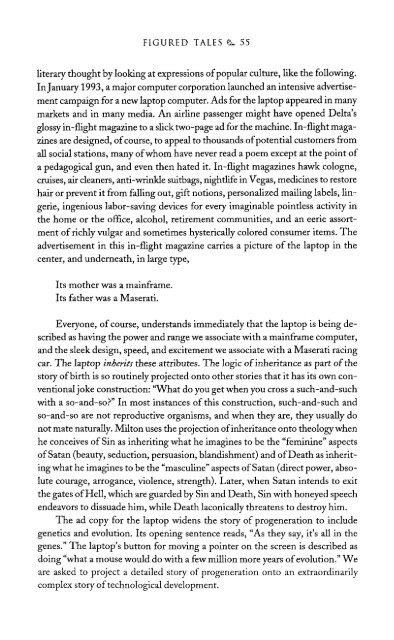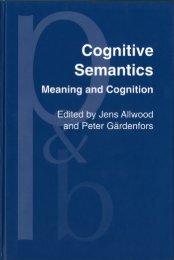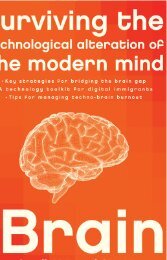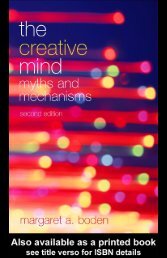The Literary Mind.pdf
The Literary Mind.pdf
The Literary Mind.pdf
You also want an ePaper? Increase the reach of your titles
YUMPU automatically turns print PDFs into web optimized ePapers that Google loves.
FIGURED TALES 55<br />
literary thought by looking at expressions of popular culture, like the following.<br />
In January 1993, a major computer corporation launched an intensive advertisement<br />
campaign for a new laptop computer. Ads for the laptop appeared in many<br />
markets and in many media. An airline passenger might have opened Delta's<br />
glossy in-flight magazine to a slick two-page ad for the machine. In-flight magazines<br />
are designed, of course, to appeal to thousands of potential customers from<br />
all social stations, many of whom have never read a poem except at the point of<br />
a pedagogical gun, and even then hated it. In-flight magazines hawk cologne,<br />
cruises, air cleaners, anti-wrinkle suitbags, nightlife in Vegas, medicines to restore<br />
hair or prevent it from falling out, gift notions, personalized mailing labels, lingerie,<br />
ingenious labor-saving devices for every imaginable pointless activity in<br />
the home or the office, alcohol, retirement communities, and an eerie assortment<br />
of richly vulgar and sometimes hysterically colored consumer items. <strong>The</strong><br />
advertisement in this in-flight magazine carries a picture of the laptop in the<br />
center, and underneath, in large type,<br />
Its mother was a mainframe.<br />
Its father was a Maserati.<br />
Everyone, of course, understands immediately that the laptop is being described<br />
as having the power and range we associate with a mainframe computer,<br />
and the sleek design, speed, and excitement we associate with a Maserati racing<br />
car. <strong>The</strong> laptop inherits these attributes. <strong>The</strong> logic of inheritance as part of the<br />
story of birth is so routinely projected onto other stories that it has its own conventional<br />
joke construction: "What do you get when you cross a such-and-such<br />
with a so-and-so?" In most instances of this construction, such-and-such and<br />
so-and-so are not reproductive organisms, and when they are, they usually do<br />
not mate naturally. Milton uses the projection of inheritance onto theology when<br />
he conceives of Sin as inheriting what he imagines to be the "feminine" aspects<br />
of Satan (beauty, seduction, persuasion, blandishment) and of Death as inheriting<br />
what he imagines to be the "masculine" aspects of Satan (direct power, absolute<br />
courage, arrogance, violence, strength). Later, when Satan intends to exit<br />
the gates of Hell, which are guarded by Sin and Death, Sin with honeyed speech<br />
endeavors to dissuade him, while Death laconically threatens to destroy him.<br />
<strong>The</strong> ad copy for the laptop widens the story of progeneration to include<br />
genetics and evolution. Its opening sentence reads, "As they say, it's all in the<br />
genes." <strong>The</strong> laptop's button for moving a pointer on the screen is described as<br />
doing "what a mouse would do with a few million more years of evolution." We<br />
are asked to project a detailed story of progeneration onto an extraordinarily<br />
complex story of technological development.















